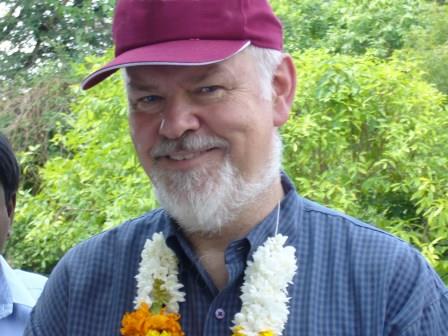THE System of Rice Intensification, a climate-smart methodology for rice production was the winner of the Olam International Prize for Innovation in Food Security.
The award recognises an outstanding innovation for its impact on the availability, affordability, accessibility, or adequacy of food, and launched in partnership with scientific organisation Agropolis Fondation to celebrate the 25th anniversary of Olam.
In a ceremony held during the 3rd Global Science Conference on Climate Smart Agriculture held in Montpellier, France, Professor Norman Uphoff and the SRI International Network and Resources Center (SRI-Rice) accepted the prize which included US$50,000 research fund.

Professor Norman Uphoff is senior advisor at SRI-Rice
Housed at Cornell University in New York, SRI-Rice promotes research and facilitates knowledge-sharing on the System of Rice Intensification. SRI-Rice serves as a global hub for the international SRI community. It promotes new rice production methodologies, provides technical assistance to development and research programmes, and advances knowledge on SRI.
In addition to tapping biological processes, SRI leverages the genetic potential of the crop and the interactions amongst plant, soil, and microorganisms. It augments yield by 20% to 50% or greater whilst reducing water consumption by as much as 50% and seed requirement by 80% to 90%. It also eliminates the need for fertiliser in many instances. All these translate to a 10% to 20% decrease in farmers’ costs.
Unlike the conventional practice of continuous flooding, SRI’s planting and growing approach comprises alternate drying and wetting of the rice field and the addition of organic matter to improve the soil. Instead of the standard 130 plants per square metre, about 16 single, very young seedlings are planted with much wider spacing. These yield deep-rooted and healthier rice plants with a wider range of soil organisms and more capable of withstanding drought, flooding, storm damage, and pests and diseases.
More than 10 million smallholder farmers are posting an average yield increase of 1.67 tons per hectare with the adoption of SRI practices. They are also reducing their costs and lowering water requirements.
This success is encouraging governments in China, India, Indonesia, Cambodia, and Viet Nam, which contribute two-thirds to global rice production, to promote SRI methods of producing rice.
According to Olam co-founder, group managing director, and CEO Sunny Verghese, “As we celebrate our 25 years in the agricultural sector, I am proud that this anniversary prize should be awarded to SRI-RICE, a team that has ‘transcended boundaries’ – the meaning of Olam. And with our own 10,000 hectare rice farm and smallholder programme in Nigeria we will certainly be exploring this research further.”
Mr Verghese noted that the innovation behind SRI is fascinating because it disrupts notions of rice farming. “Such disruption is essential if we are to feed 9 billion people by 2050. Grown by 200 million small-scale farmers, rice is the world’s staple diet, so I am delighted that Olam is helping to scale up practices so clearly proven to increase yields, thereby reducing the pressure on precious arable land and water. On top of this, there are no costs to the farmer which provides three benefits: firstly, communities have increased access to vital calories without paying more; secondly they can improve their livelihoods by selling the surplus and lastly, through that surplus they are supporting global food security needs,” he stated.
Pascal Kosuth, director of Agropolis Fondation and jury member for the Olam Prize, said: “The SRI-Rice team stood out for the demonstrable impact their research and outreach on paradigm-shifting methodologies is having in over 55 rice-growing countries globally. Prof Uphoff and the SRI-Rice team at Cornell University are working with a vast global network to build a body of scientific evidence demonstrating that significant yields can be achieved from the same land by simply better understanding the natural synergies between plants, soils, water, nutrients, soil organisms, and climate.”
SRI-Rice senior advisor Prof Uphoff accepted the award, saying, “Along with the rest of the SRI-Rice team and the hundreds of colleagues all around the world who have made SRI a reality on the ground, I am honoured to receive this award from Olam, one of the world’s largest agribusinesses and a team that knows very well the importance of agricultural science to ensuring food security. However, this award must be dedicated to the memory of Père Henri Laulanie, whose ideas and observations working with impoverished farmers in Madagascar some 30 years ago provided the basis for all SRI research.
“Scaling up SRI and its derived System of Crop Intensification (SCI) is a matter of changing mindsets, habits and practices, and the recognition Olam has bestowed on us with this award marks a milestone in terms of support from the private sector. The Olam Prize money will be used to support further research, particularly around how SRI management methods can reduce methane gas emissions – essential in the fight against climate change – as well as on the role of soil microbes in the uptake of nutrients.”
Entries for the Olam Prize for Innovation in Food Security were judged by an international panel of experts in conjunction with the Louis Malassis International Scientific Prizes. The other winners are Kazuki Saito of the Africa Rice Center for Young Promising Scientist, Claire Lanaud of CIRAD for Distinguished Scientist, and Zyaur Khan of ICIPE for Outstanding Career in Agricultural Development.
Nike Air Max 90 Womens Grey













